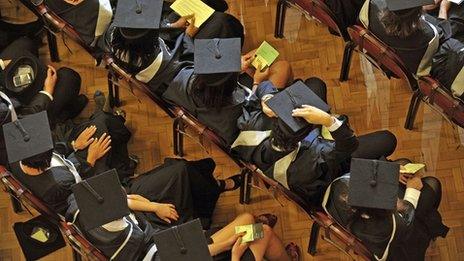University student debt sanctions 'may breach law' - OFT
- Published

Universities are being challenged about preventing students graduating
Universities have been told they could be breaching consumer law by preventing students from graduating because of minor debts other than tuition fees.
The Office of Fair Trading has written to universities warning against calling a halt to graduations because of non-academic debts, such as library fines.
The consumer watchdog says about three-quarters of universities have such blanket bans on students owing money.
The warning follows representations by the National Union of Students.
The NUS complained that even owing money on an overdue library book might be enough to prevent students from being allowed to graduate.
The union said this would also apply to other unpaid debts, excluding tuition fees, such as accommodation, childcare services or money owed for university car-parks.
Students argued that this was disproportionate.
'Alternative' approaches
The OFT says it shares these concerns, saying that the "blanket use of academic sanctions" could breach consumer-protection law, and it has told universities to reconsider their terms and practices.
There were particular concerns about the sanction applying to small amounts of money.
"Preventing progression or graduation not only affects students' educational experience but could also significantly harm their future employment prospects and ability to pay off their debts," says the OFT's Nisha Arora.
"That is why we are writing to all universities today to ask them to review their terms and practices in light of the OFT's report.
"Not all universities use these terms, and our report identifies some examples of alternative approaches. We expect all institutions to ensure that their rules and methods for debt collection are fair and comply with the law."
Colum McGuire, NUS vice-president for welfare, said the OFT's warning was confirmation that such a sanction was "incredibly unfair".
"It's almost laughable that students who are in thousands of pounds of tuition-fee debt were having academic sanctions placed on them for money owed for non-academic debt.
"Students who owe money for accommodation, overdue library books or other non-academic debt should certainly pay off the money they owe, but this sanction was disproportionate."
Tuition-fee debt at English universities remains a separate issue, usually paid back by students after graduation once former students have reached an earnings threshold.
But many universities will stipulate that for those who have to pay tuition fees in advance, such as overseas students, any unpaid fees will prevent graduation.